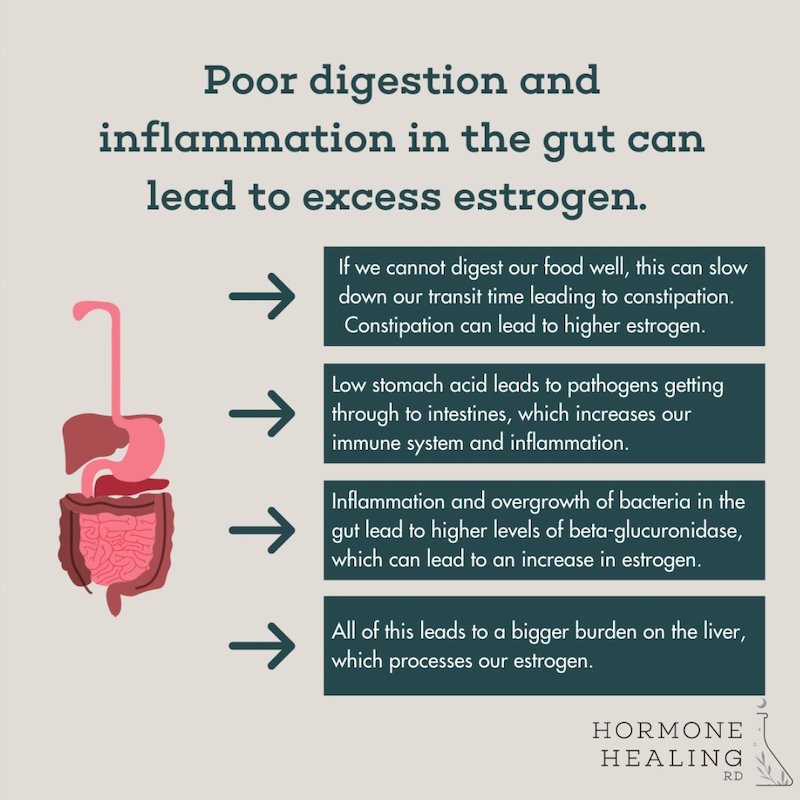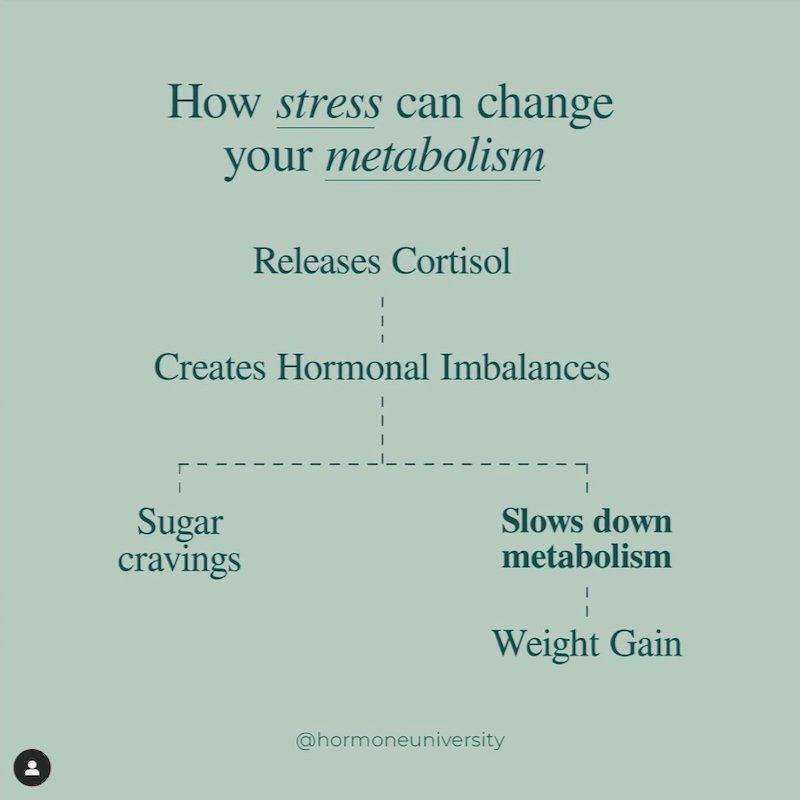Your Gut Might Be The Root Of Your Hormonal Symptoms. Here’s How.
by Marissa Pomerance
Excruciating periods. Debilitating PMS. Difficulty losing weight. Apparently, these are just “normal” things that women deal with as we...age. It could be from menopause, or peri menopause, or part of the physical hellscape we all just expect after having kids. But. It’s possible these symptoms that accompany our ever-changing hormones aren’t normal. It’s possible these symptoms are linked to the gut. No, not leaky gut. And no again, this isn’t about dieting.
This is about the inextricable link between the microbiome and our hormones.
Yes, the hormonal symptoms you can’t seem to escape, like PMS, painful periods, PCOS and weight gain might be the result of your digestive problems. Your gut health has the power to alter your delicate balance of hormones, and those hormones, in turn, can alter your gut health, forcing you into an endless cycle of hormonal-gut chaos.
Here’s how. And here’s what to do about it.
The Gut Isn’t Just Your Stomach
Most of us are still not 100% sure what part of the body is “the gut.” But, as it turns out, your gut refers to your entire gastrointestinal system. This includes the mouth, esophagus, stomach, liver, small intestine, colon, gallbladder, pancreas, and rectum. No wonder the term is so confusing—it seemingly covers half of your body.
Our gut does a lot for us, and when it’s healthy and balanced, it can protect against pathogens, keep our digestive systems humming along smoothly, and help regulate our hormones. But, a lot of things can disrupt our gut; sugary, processed foods, antibiotics, not enough sleep, and too much stress, to name a few.
Unfortunately, the health of your gut has implications beyond just your daily bout of bloat. Your gut can actually impact almost every other part of your body. And the “microbiome,” which is a combination of microorganisms within the gut (like bacteria, viruses, and fungi), operates like another organ, affecting a bunch of physiological processes.
Specifically, it’s the balance of these different microbes that can determine how well our gut functions, and a compromised gut means that these microorganisms are imbalanced or less diverse, which throws off the overall functioning of the gut, which can contribute to issues like obesity, brain disorders, and hormonal imbalances.
Your Gut Microbiome Regulates Your Hormones, And Vice Versa
Considering the gut is a multi-tasking workaholic, is it really a surprise that your gut health is linked to your hormones?
Though we usually think of hormones as regulated by our brains or reproductive systems, our gut actually plays a huge role in the regulation and expression of hormones. In fact, we have cells in our gut lining that produce and release hormones. And the release of these hormones is directly influenced by our microbiomes.
But, this relationship actually goes both ways. So while the gut influences hormones, hormones can also influence the gut.
Your Gut Might Be Screwing With Your Balance Of Estrogen
Whenever there’s the slightest chance for hormonal disruption and chaos, estrogen is there. That bitch. Look, we’re not saying that estrogen is the root of all evil. Estrogen does a lot for us. But, when it gets out of balance—which seemingly happens so, so easily—disaster ensues. And the health of your microbiome might actually be causing an estrogen imbalance.
Our gut microbiome has a lot to do with regulating estrogen. In fact, the process by which the microbiome regulates estrogen even has its own name-- the estrobolome—which is a part of the microbiome. Some in the medical community even believe that the estrobolome could be responsible for tons of physiological processes relating to women’s health, like playing a role in our risk of developing breast cancer.
Age, diet, alcohol, and antibiotic use are just a few things that can disrupt the estrobolome, affecting how it produces enzymes, causing a chain reaction that determines how much estrogen is released and absorbed by the body. Meaning that your microbiome can directly cause an estrogen imbalance.
And these estrogen imbalances can produce a seemingly infinite number of issues, like obesity, metabolic problems, cancers, PCOS, and cardiovascular disease. Low levels of estrogen are linked to fatigue, hunger, and weight gain. And too much estrogen can contribute to some of those other fun symptoms we described earlier—PMS, endometriosis, and, of course, weight gain, again. All of this may be linked to this intricate relationship between the gut and estrogen.
Unfortunately, this issue just compounds on itself; as we mentioned earlier, the relationship with the gut and hormones cuts both ways. So while the gut can affect estrogen levels, circulating estrogen has been shown to impact gut health in return, encouraging the growth of certain types of bacteria and altering the microbiome.
Shockingly, Stress Doesn’t Help
That stress can upset your stomach isn’t new information for anyone that’s suffered from anxiety-induced IBS. But apparently, your stomach troubles aren’t only a result of stress-eating an entire tin of boxed brownies. And it’s not just that stress is making us eat more crap. Our stress hormones are actually wreaking havoc on our microbiome.
Stress can alter the composition of our gut; stress hormones create an immune response, which increases inflammation, disrupting the microbiome through an increase in bad bacteria. In fact, stressful, traumatic situations might play a role in long-term digestive issues. And just like with your other hormones, while stress disrupts the microbiome, the gut can send signals to the brain that make you more stressed and anxious. Fun.
Apparently, stress can also increase our gut permeability by damaging the protective barrier that keeps everything in our gut inside our gut, allowing these bad bacteria and pathogens to seep out our gut, producing an immune response, which, guess what? Leads to an increased stress response.
And allllll of this-- the constant stress, the inflammation, the compromised microbiome-- can potentially cause a bunch of shitty issues, but in particular, is a particularly potent recipe for weight gain.
BUT! There’s Hope
I know—that was a dizzying amount of information. But it’s not all bad. As we learn more about the gut and its relationship with hormones, we’re also learning that by studying both, the medical community might finally come out with better treatments for each.
We know that the overuse of antibiotics can be harmful to gut bacteria, and we’re learning which exact strains of fiber can encourage the growth of “good” gut bacteria. As we learn about the relationship between trauma, stress, and the gut, we’re learning whether psychological and behavioral therapies (typically used to help anxiety) can also help aid digestive disorders. Probiotics and prebiotics, which feed our “good” gut bacteria, could potentially have a role in aiding everything from digestive disorders to anxiety and depression to immune function. Phage therapy, which uses specific bacterial viruses to treat bacterial infections, is regaining popularity as an alternative treatment to antibiotics. Researchers are even testing new treatments for bacterial vaginosis by injecting bacteria INTO the vagina. And experimental fecal transplants are showing promise not only for conditions like C. diff infections, but also autism and Alzheimer’s.
And all of these studies have potentially huge implications; imagine that you could pinpoint a disease by a single strain of bacteria, and treat it with a single type of probiotic, or by removing something simple from your diet.
So while it can seem like our guts and hormones are just totally fucked from years of chowing down refined sugar and antibiotics, learning about it now can actually give us the tools to finally figure out what the hell is going on. And yes, that might include altering our diets, getting more sleep, exercising, yada. But, it also gives us more potential tools for dealing with hard-to-treat hormonal imbalances like PCOS and endometriosis.
So Now What?
We’re all sick to death of reading that we should just “eat leafy greens” or “cut down on refined sugar” or “drink more kombucha.” Though, we do actually recommend the last one— this kombucha is truly excellent and actually delicious. Still, you can eat a more plant-rich diet. Use antibiotics judiciously. And even though those things seem small and potentially ineffective, but they’ve been shown to have huge effects on the microbiome over time.
But, we also know that these are tips we’ve basically become numb to, so we’ve assembled a few more ideas and resources focused on the most up-to-date gut science:
Try a synbiotic: There are approximately 803 probiotic brands at Whole Foods, each bottle decorated with confusing, science-y seeming terms. You’ve probably tried a few of them with no real results. But, the brand Seed not only offers a science-backed synbiotic (probiotic + prebiotic), it’s also an incredibly helpful, science-driven resource for learning more about the microbiome, probiotics, and health. It’s a great place to start.
Get a microbiome test and personalized results: Gut health and hormones (like every other health issue) are incredibly personal. So here’s a little secret that seems very underutilized; if you want a specific picture of your microbiome, you can get your gut tested. Yes, it will likely involve a poop sample. BUT, you’ll receive personalized dietary recommendations based on your unique microbiome composition. No two microbiomes are the same, so if you’ve tried gluten-free and vegan and leafy-green-forward with no results, this option could give you further insight into the otherwise “healthy” foods that might be causing you problems. Some of these tests (like the one from Viome) might tell you to avoid certain otherwise “healthy” foods (like spinach or bell peppers), because you have a certain bacteria that interacts negatively with them. They might even you the green light to enjoy those grains you’ve been avoiding because, it turns out, they might be perfectly fine for your gut.
Check out Gut Microbiota For Health: This is a blog/website created by the European Society for Neurogastroenterology and Motility with tons of helpful gut health information, the latest gut health research, and tips from verified experts.
And check out Love Your Gut: Sure, the name’s a bit basic, but this website is another great resource full of information on gut health, along with microbiome-friendly recipes, and guides on different gut disorders and when to see a doctor.
Knowing that there might be a connection between your gut and frustrating hormonal issues can, at the least, bring awareness to how your entire body is involved in these processes, which gives you a place to start and more options to explore. And maybe, if you’re really lucky, your microbiome test will reveal that chocolate and wine are amazing for your gut bacteria. A girl can dream.
Marissa Pomerance is the Managing Editor of The Candidly. She’s a Los Angeles native and lover of all things food, style, beauty, and wellness. You can find more of her articles here.





